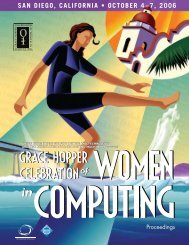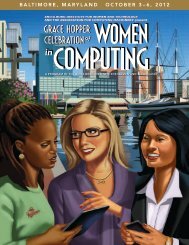ABI-ONE ghc program v14.indd - Grace Hopper Celebration of ...
ABI-ONE ghc program v14.indd - Grace Hopper Celebration of ...
ABI-ONE ghc program v14.indd - Grace Hopper Celebration of ...
You also want an ePaper? Increase the reach of your titles
YUMPU automatically turns print PDFs into web optimized ePapers that Google loves.
ANITA BORG SOCIAL IMPACT AWARD WINNER<br />
Ann Quiroz Gates<br />
ThuRSDAY, 7:00 – 9:00 PM – CENTENNIAL BALLROOM I-IV<br />
FRIDAY, 4:15 – 5:15 PM – SINGAPORE/MANILA<br />
uNDERWRITTEN BY MICROSOFT RESEARCh<br />
The fifth Anita Borg Social Impact Award, an international prize, honors an individual<br />
who has caused technology to have a positive impact on the lives <strong>of</strong> women and society or<br />
who has caused women to have a significant impact on the design and use <strong>of</strong> technology.<br />
The recipient <strong>of</strong> the 2010 Anita Borg Social Impact Award receives a $10,000 award.<br />
Dr. Ann Quiroz Gates is the Associate Vice-President <strong>of</strong> Research and<br />
Sponsored Projects at the University <strong>of</strong> Texas (UTEP) at El Paso. As the<br />
founder <strong>of</strong> the Computing Alliance for Hispanic serving institutions<br />
(CAHSI), Dr. Gates is dedicated to and has been highly successful in<br />
the retention, recruitment, and advancement <strong>of</strong> Hispanic women in computing.<br />
Under Ann’s leadership, CAHSI institutions have reinforced the academic pipeline<br />
at three critical intervention stages: the transition from high school to college, college<br />
to graduate school, and graduate school to the pr<strong>of</strong>essoriate. In the first stage, a lack<br />
<strong>of</strong> preparedness and prior experience in computing are unforgiving gatekeepers. Ann<br />
and her colleagues have employed graphics and animation technology to attract and<br />
engage students unfamiliar to <strong>program</strong>ming, problem solving, and computational<br />
thinking. In addition, she promotes a model that extends the number <strong>of</strong> students<br />
involved in research through inclusion <strong>of</strong> theose who have the capability, but who<br />
have not considered research. This develops the skills students need to be successful.<br />
The third key stage supports transitions from graduate school into the pr<strong>of</strong>essoriate.<br />
Transferring effective practices from a $3.5M NSF ADVANCE grant funding at<br />
UTEP to create a cohort at the pr<strong>of</strong>essoriate level, Ann and her CAHSI colleagues<br />
have focused on increaseing the participation and advancement <strong>of</strong> women in<br />
academic science and engineering careers. The numbers demonstrate the real significance<br />
<strong>of</strong> Ann’s contributions. Ann’s leadership and vision has been instrumental to<br />
CAHSI’s many achievements. To drive pr<strong>of</strong>ound change in industry hiring practices<br />
it is crucial to produce a sizeable population <strong>of</strong> skilled women and minorities within<br />
the computing workforce. Ann’s establishment <strong>of</strong> CAHSI and its initiatives at the<br />
first stage <strong>of</strong> the academic pipeline, from high school to college, directly addresses this<br />
challenge.<br />
To successfully compete for NSF funding for CAHSI, to pull together the diverse<br />
group <strong>of</strong> institutions and leadership that constitute the CAHSI alliance, to successfully<br />
navigate these institutions through the politically charged and financially<br />
constrained waters <strong>of</strong> their respective state and institutional leadership, and finally to<br />
be renewed for a second round <strong>of</strong> NSF funding – all these achievements are clearly<br />
demonstrative <strong>of</strong> the relentlessness <strong>of</strong> Ann’s vision to change the face <strong>of</strong> computing.<br />
Ann’s impact has no geographical boundaries, and her work can easily be extended<br />
to other countries, particularly those in Central and South America, which have<br />
sizeable Latino populations. Ann’s leadership is making a significant social impact by<br />
increasing the number <strong>of</strong> Latinos and Latinas graduating from college and seeking<br />
graduate studies in STEM fields. Her outreach efforts have demonstrated her<br />
commitment to ensure an effective pipeline from academia into industry.<br />
About Ann Quiroz Gates<br />
Ann Quiroz Gates is the Associate Vice<br />
President <strong>of</strong> Research and Sponsored<br />
Projects at the University <strong>of</strong> Texas at<br />
El Paso and past chair <strong>of</strong> the Computer<br />
Science Department. Her research<br />
areas are s<strong>of</strong>tware property elicitation<br />
and specification, and workflow-driven<br />
ontologies. Gates directs the NSF-funded<br />
Cyber-ShARE Center that focuses on<br />
developing and sharing resources through<br />
cyber-infrastructure to advance research<br />
and education in science. She was a<br />
founding member <strong>of</strong> the NSF Advisory<br />
Committee for Cyberinfrastructure, and<br />
she served on the Board <strong>of</strong> Governors<br />
<strong>of</strong> IEEE-Computer Society 2004-2009.<br />
Gates leads the Computing Alliance for<br />
Hispanic-Serving Institutions (CAHSI),<br />
an NSF-funded consortium that is<br />
focused on the recruitment, retention,<br />
and advancement <strong>of</strong> Hispanics in<br />
computing and is a founding member<br />
<strong>of</strong> the National Center for Women in<br />
Information Technology (NCWIT), a<br />
national network to advance participation<br />
<strong>of</strong> women in IT. Gates received the 2009<br />
Richard A. Tapia Achievement Award for<br />
Scientific Scholarship, Civic Science, and<br />
Diversifying Computing and was named<br />
to Hispanic Business magazine’s 100<br />
Influential Hispanics in 2006 for her work<br />
on the Affinity Research Group model that<br />
focuses on development <strong>of</strong> undergraduate<br />
students involved in research. She<br />
received her Ph.D. from New Mexico<br />
State University in 1994.<br />
86 Anita Borg Institute for Women and Technology | <strong>Grace</strong> <strong>Hopper</strong> <strong>Celebration</strong> <strong>of</strong> Women in Computing




